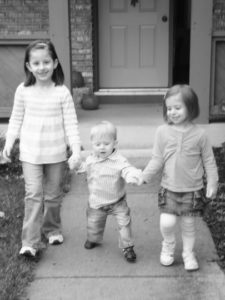 Do you remember when your sleep-deprived eyes looked into your newborn’s wide awake-at the unGodliest of hours-ones? And you thought, Perfect. You’re absolutely perfect.
Do you remember when your sleep-deprived eyes looked into your newborn’s wide awake-at the unGodliest of hours-ones? And you thought, Perfect. You’re absolutely perfect.
Better yet, do you remember before you had kids? And you looked at other moms with their children and thought, My kids are going to be way, WAY more perfect than that.
And then, remember actually having kids? And realizing that while “good” is innate, perfect is not. And mistakes happen. Often.
There’s spilled milk mistakes. Broken toy mistakes. Hurt feelings mistakes. Bad word mistakes. Up too late mistakes. And too much sugar mistakes. The list is endless. Just this past weekend Jason and I overheard this “mistake:”
Whap!
Sorry!
BighugefatCRY!
But I didn’t do anything!
Mo-om!!
Sigh. We all make mistakes. You, me, that mom over there. And so do our kids. We know how it feels to be mistake-full and we love our kids to pieces, so we build them up and tell them how good, wonderful and great they are. We brush off mistakes as something natural, normal and an everyday occurrence. But every once in awhile, we also have to make our children aware of their mistakes and how they’ve affected another’s heart.
And that’s the part of parenting that keeps me awake at night. The singing, the play doh, the occasional tantrum. Those I can handle. But making sure that my kids turn end up nice, kind, good people? That’s really and truly…hard. Shocking, I know.
There’s a variety of puzzle pieces that create a beautiful heart and a beautiful person. Honesty, compassion, love. In my mind, kindness is a must-have. And hand-in-hand with kindness? The part that’s not negotiable but not exactly crystal clear in the how-to-teach department? Is empathy. Empathy comes into play because sometimes “mistakes” are the scrapes and bruises that happen to someone else because of us. Over a toy, a difference, a word.
Jason and I have talked (and talked and talked) about accountability and empathy. We’ve shown tear-streaked faces and explained and modeled how much we value kindness. Sometimes we see the direct results of these little moments and our eyes tear up with joy. And other times, like the other morning when we heard that unmistakable Whap, our eyes tear up with a different emotion. Both being former teachers, we know that sometimes a fresh voice packs the most powerful punch and sends the message in a more poignant way.
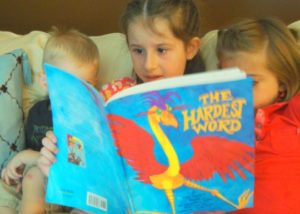 So when we received the PJ Library Book The Hardest Word by Jacqueline Jules in the mail, I was thrilled. I adore the Ziz for his gorgeous feathers. For his sweeping gestures. And for his casual convos with God at his special place, Mount Sinai. Obviously.
So when we received the PJ Library Book The Hardest Word by Jacqueline Jules in the mail, I was thrilled. I adore the Ziz for his gorgeous feathers. For his sweeping gestures. And for his casual convos with God at his special place, Mount Sinai. Obviously.
But in this book, where the Ziz accidentally ruins the children’s garden and it cannot be fixed. Where the Ziz instantly feels badly for the children. Where the hardest word to say is “sorry.” This book is purely a teachable moment in the making. The Ziz arrives to apologize for the garden damage with his own garden’s bounty to share with the children. The restitution, the fixing, is so naturally embedded in the apology. It’s not called out, spelled out, or anything else-out. It’s just the way it is.
And that’s what I love. Empathy, accountability and restitution. The stuff that goosebumps are made of.
Chloe, also extremely sensitive and loving, doesn’t mind owning up to her mistakes. This is partly because she doesn’t naturally see how she affects other people. Sometimes in the best of ways. Sharing a toy. Including someone in play. Handing a freshly-picked dandelion to a friend. Pointing out and reveling in those instances is easy. They’re the big, squeezy hugs-I am so very proud of you-moments that we all imagined and looked forward to from the second our newborn’s tiny little fingers grasped our own, suddenly gargantuan, more weathered hands.
But in the blink of an eye, Chloe can also turn a That’s my girl! moment into a cringe-worthy one. Grabbing a toy. Pushing. Excluding. Ignoring. All of these “things” that to be perfectly honest with you, I just assumed my children would never do. And she needs to see the affects of these choices, too. Empathy with accountability.
Teaching empathy is tricky because we never want to make our kids feel uncomfortable or unhappy, embarrassed or wrong. But we need to literally feel those feelings in order to put ourselves in another’s shoes. I remember reading that the best anecdote to tantrum-throwing children is to have a tantrum of your very own. I have never had the guts to throw myself on the floor kicking-and-screaming-style just to show my kids what that moment feels (and sounds) like from everyone else’s point of view. But I’ve thought about it. There’s a picture-in-your-mind that I wouldn’t mind erasing!
In The Hardest Word, the Ziz feels empathy for the children from the get-go. He owns up to his mistake, soul searches with a little help from God (You remember, at Mount Sinai) and then he apologizes and fixes everything in the happily ever after part of the story. In other words, the Ziz is a spot-on example.
I do realize that asking my children to compare and model their behavior after a loud, over-the-top, big-gesturing, quick-moving, mistake-making, magical bird has the potential to ahem- backfire on me. But then again, many parenting tricks-of-the-trade do. This one just happens to include a fabulous bird. And who (at least in the under under-eight set) wouldn’t be inspired by that?


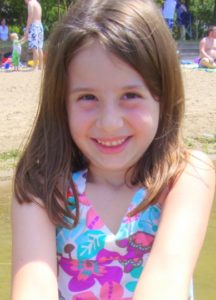
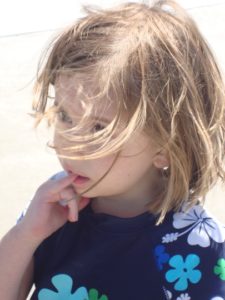
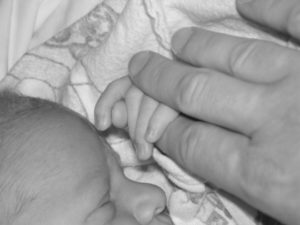



Jordan is my empathizer and Jon Alex is my Chloe who is also me. I’ll say I’m sorry because you let me know I hurt your feelings, but if you don’t tell me, I’ll assume my witty zinger went completely appreciated. We’re waiting for Brody’s and Ehren’s entrances into the I’m sorrys, I guess? I think Ehren feels a certain amount of contrition, and tries to make up for knocking out two of my teeth with a lean against my chest and some bottle suckin’. Sooooo cute.
Having just experienced one of my 15 month old’s first “real” (loud, throwing herself on the floor, wailing…) tantrums, this article truly was a perfect read today!! Thanks for the excellent reminder of those 3 magical words: empathy, accountability, and restitution. It’s a complicated process, but with those actions as the foundation there is a light!
Another thoughtful and thought provoking post, my dear. Sometimes I am overwhelmed by the incredible responsibility there is in having and raising children—and teaching them the right and/or correct things, including empathy…It is so HUGE….I know I never could have done it and it is a good thing I never had any children….You and your husband take parenting so very seriously and in such a loving and caring manner….I bow down to you both, in admiration and in awe, my dear….! The subtlties of all of these things you spoke about….The balance….Like trying to keep a Seesaw right in the middle and in a calm non-shaky way. I can only say that I think your chiildren are so very lucky to have you and Jason as their parents.
And…..
Shabat Shalom!
I love it when children have empathy hardwired into their brains and only need a little jump start to get that motor running. That’s how my oldest son was. Just plain easy.
My daughter was very much accountable for her actions and worried about how they affected others…when she was younger. I found that the older she got, the less she worried. Which, in turn, worried me. Now that she’s an adult, I’m seeing a switch and she is finding a balance that I’m sure is somewhere between a doormat and the center of the universe. I’m thankful:)
My middle child, on the other hand, I dunno. I think sometimes threats work, if they’re difficult to teach. I clearly remember when he was in grade school and there was a particular girl who he butted heads with and said terrible things about. I made him sit down and write ‘5 things I like about Marjorie Robertson’. I kept that(still have it somewhere) and threatened to give it to her if he continued to say anything negative about her. It worked but I’m not sure that it ‘taught’ him anything.
So, yes…I agree. It’s very hard, hard, hard to ensure your children will grow up kind & good people. Especially in the ‘me’ world we are living in.
Oh, G. This post was… well, perfect. Again I wonder how you do it. Pause. Must wipe my tears again. “Empathy with accountability”. Genius. And how about, “And that’s what I love. Empathy, accountability and restitution. The stuff that goosebumps are made of.” I think you should write a blog about goosebumps. You give ’em to me all the time.
I apologize to my kids often. Not about little stuff- but for my “big Mommy mistakes”. Like, snapping at them and then having to dry their tears, or promising to remember to bring a special pillow on vacation and completely spacing it out. Sometimes I cop the “Oh, you’re fine. It’s no big deal attitude.”, but mostly I just apologize. And mean it. I want them to badly to be able to say “I’m sorry” without associating it with a sense of defeat…I think it took Shea six years to apologize without being prompted. She was a stinker.
…oops. Wasn’t done. Is this computer trying to tell me to wrap it up??
Anyways- It’s hard to say sorry. I get it. But it’s so much easier than the alternative!
Love you, Girl. Thanks for the best morning companion with my cup of coffee again. (A day late- no computer yesterday…)
I have so done the tantrum thing with my kids-even those a bit older and it works a charm. They either burst out laughing, or realize how ridiculous they are. Basically you are acting like a mirror.
It’s interesting that you connected empathy with accountability. Need to mull that over when my brain and heart are clear and not full of grief.
Thanks for your comment about my sister.
Loved loved LOVED this article! So great to find like minded moms out there- in this day and age, hearing your kids ‘thank’ each other for things, or say ‘excuse me’ is something we should all treasure!
And loved the part about how before we were moms, we all had our judgments (‘how can she just LET her child yell like that in the supermarket?’ or ‘I would NEVER do that with MY future kids’- talk about who gets the last laugh!)
At the end of the day, we are all human and the best is all we CAN do… so here’s to all you mamas out there doing the BEST that we can do:)
I think how to teach empathy, bring that concept into our lives alongside kindness is endlessly fascinating. (NYT just had a great piece on parents/schools in this regard in response to the new laws in MA).
What I forget as a parent is how many times it takes to “get” this, & not to judge myself, my parent self, a failure at each meaner than I’d like moment.
It sounds as if you & Jason are so so so on the right road.
My husband and I have not been able to have children, though I’d always planned on them, and studied Early Childhood Education, and worked as a nanny for two families. I love how you pointed out the two sets of children – the imaginary ones you hadn’t had yet, and the actual ones who don’t always do things the way you’d dreamed they would. LOL!
As long as your modeling behavior includes empathy and accountability, your kids will develop these qualities when they can internalize them. That’s been my experience as my family and friends have raised their children. There’s always a shock when their children display less-than-sweet impulses, but when the parents themselves display kindness and empathy as an everyday thing, the learning curve of whacks between playmates gets sorted out quickly.
Very cool article and something that was easy to relate to. Empathy, accountability and restitution.
I really like that.
Galit, great piece. I am very familiar with that cringe feeling when the kids behave differently from what we would expect. This is my challenge to continue loving them and viewing these mistakes as reminders of what we still need to work on.
What a beautiful and important piece! Empathy is perhaps elusive in a complete way and yet a major part of our purpose on earth is to strive toward truly feeling for others. great writing.
thanks y’all! i so adore the connections we’re making with the ziz in the middle!
erica, isn’t it funny how we can pinpoint which of our traits went right on through to our children? kayli is so, so me. *sigh* and ehren– is sigh-worthy adorable, indeed!
bex, thanks so much for the note! *your* 15 month old is an absolute angel! that ‘lil red-headed tantrum couldn’t be cuter– at least from this point of view!
naomi, thank you lady! your words are so lovely and the imagery is perfect– parenting *is* like a seesaw, sometimes up and sometimes down. i’ll soak in your compliments, though, because they mean the world to me!
christine, hi! lovin’ your avatar pic! 🙂 isn’t it funny how we can instantly see where our kids fit into here? i think the finding something nice to say (5 somethings!) was an excellent idea! much easier to empathize, even with a movie or book character or whatever, when there’s something likable about them. it sounds like your oldest is where we’re all striving to be! good for *you,* mama!!
kee, thanks girl! sending all of that goosebump-love right back at ya! your writing is…beautiful! i really love what you wrote about apologizing to our children (and meaning it). that’s HUGE! and the i’m sorry sans defeat, i suppose if we all had that it wouldn’t be hard to apologize, would it! your kids & the rest of us? lucky to have *you!*
susie, thanks so much for your note. you brave, brave mama you! that move is still in my back pocket! i’ll let you know if i ever just decide to go for it! still sending you and yours peaceful thoughts! i hope they’re getting there!
mommzy, amen sista! amen! no surprises, WHATSOEVER, that we’re on the same page, though! we just keep giving ’em all we’ve got, right? and then we try again the next day– after some chocolate rejuvenation, right?! 🙂
sarah, thanks, as always for your gems of wisdom. not being too hard on ourselves is key for our own spirits, but also in showing our kids that they can bounce back when they fall.
julia, i think you’re right on. the internalization *does* take awhile for most and the modeling (from parents and others around them) plays such a vital roll. my mil talks about “like minded people” and i so get that now! i’m glad that you’re sharing what you know through so many avenues– because what you know– is important!
thanks jack, from you– i’ll take that compliment thankyouverymuch! 🙂
leah, thanks lady! indeed, loving them is one thing that we can *never* do too much of!
neil, i so agree with you! empathy is much too little discussed, right? & not to go all john lennon on you, but *imagine* if we were all more mindful of others and their feelings? *sigh* thanks for the note– it’s always great to hear from you!
This is perfect, Galit. Your kids are some of the kindest children I have ever met. I think you should feel proud 🙂
thank you, friend! *huge* compliment from you and seriously– right back at ya!
Such a beautiful post. Your kids are lucky to have you as their mother.
batya, thank you. truly. 🙂
Even though my children are grown and entirely on their own now, I remember the struggles you describe here vividly, trying to teach both empathy and accountability. It is an honor to know that you find the Ziz and my book, The Hardest Word, helpful in your parenting journey. And I love that wonderful picture of your kids reading the book. Thank you!
Jacqueline Jules
http://www.jacquelinejules.com
jacqueline, hi! i’m so, so honored that you’re here! thanks you so much for that and, of course, for the ziz!! 🙂